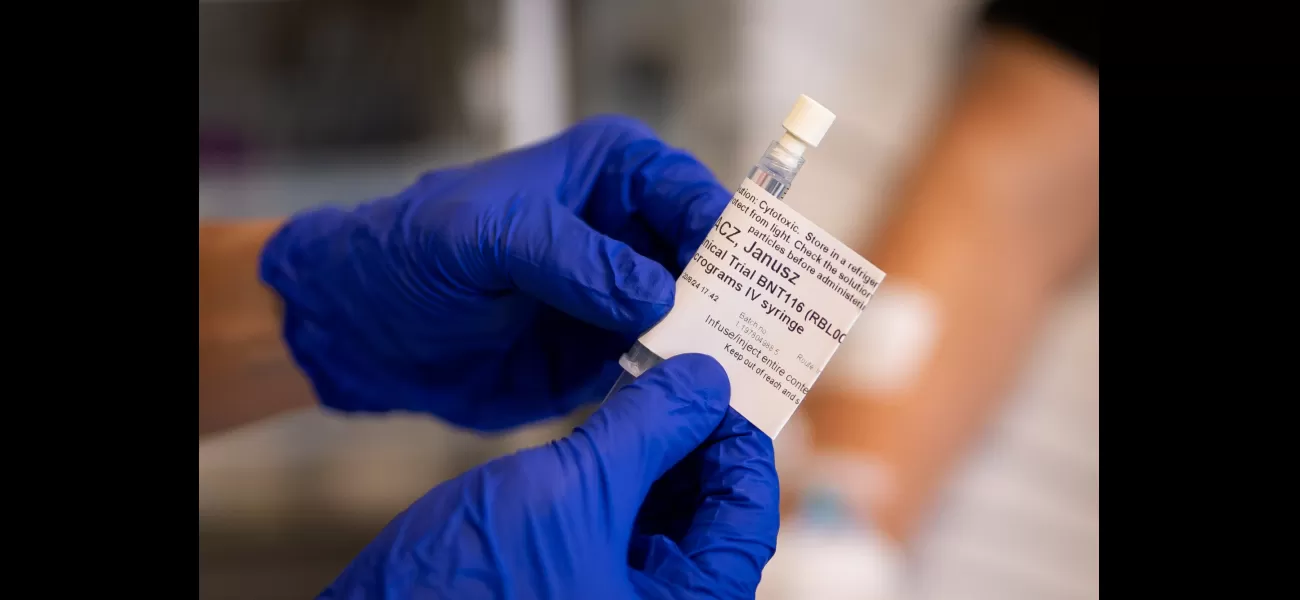New cancer vaccine trialed on British patient
In the UK, approximately 48,000 individuals are diagnosed with lung cancer annually and 35,000 lose their lives to it.
August 22nd 2024.

A groundbreaking new vaccine has been developed that could potentially save thousands of lives. This innovative vaccine, called BNT116, is designed to prime the immune system to recognize and fight against lung cancer. It is now being tested on patients in the UK for the first time, with researchers hopeful that it could not only improve survival rates but also become the standard treatment worldwide.
Currently, lung cancer is a major cause of death in the UK, with 48,000 people being diagnosed and 35,000 dying from the disease each year. BNT116, made by BioNTech, specifically targets non-small cell lung cancer, which is the most common form of the disease. Similar to the Covid-19 vaccines, this vaccine utilizes messenger RNA to present the immune system with tumor markers from NSCLC. This primes the body to fight against cancer cells expressing these markers, while leaving healthy cells unharmed, unlike chemotherapy.
Janusz Racz, a 67-year-old man living in London, is the first person in the UK to receive this ground-breaking vaccine. As a scientist specializing in artificial intelligence, he understands the importance of participating in medical trials to advance science and potentially save lives. He hopes that by being a part of this trial, he can not only benefit from this new treatment but also contribute to the development of this innovative approach.
The trial, which will involve 130 lung cancer patients, will be conducted at 34 research sites in seven countries, with six located in England and Wales. The first phase of the trial, which is the first in-human study of BNT116, will involve patients receiving the vaccine alongside standard immunotherapy. This combination is expected to not only improve survival rates but also potentially prevent the cancer from recurring.
Professor Siow Ming Lee, a consultant medical oncologist at University College London Hospitals NHS Foundation Trust, who is leading the trial in the UK, expressed his excitement about this new technology. He believes that it has the potential to revolutionize cancer treatment and greatly benefit patients. He also emphasized the importance of personalized treatments, not only through the use of EGFR but also through adding an additional immune approach through this mRNA vaccine.
Each injection of the vaccine contains different RNA strands and Mr. Racz received six consecutive injections during his first visit to the National Institute for Health Research UCLH Clinical Research Facility. He will continue to receive the vaccine every week for six weeks and then every three weeks for a total of 54 weeks.
The ultimate goal of this trial is to save lives and improve the survival rates of lung cancer patients. With the standard immunotherapy treatment already showing significant improvement, researchers are hopeful that this new vaccine will provide an extra boost and potentially prevent the cancer from recurring.
In July 2023, the UK government signed an agreement with BioNTech to provide up to 10,000 patients with precision cancer immunotherapies by 2030. Science minister Lord Vallance expressed his support for this groundbreaking vaccine, stating that it has the potential to save the lives of thousands of people diagnosed with lung cancer every year. He also emphasized the importance of backing researchers in their pursuit of revolutionary treatments for diseases like cancer.
Currently, lung cancer is a major cause of death in the UK, with 48,000 people being diagnosed and 35,000 dying from the disease each year. BNT116, made by BioNTech, specifically targets non-small cell lung cancer, which is the most common form of the disease. Similar to the Covid-19 vaccines, this vaccine utilizes messenger RNA to present the immune system with tumor markers from NSCLC. This primes the body to fight against cancer cells expressing these markers, while leaving healthy cells unharmed, unlike chemotherapy.
Janusz Racz, a 67-year-old man living in London, is the first person in the UK to receive this ground-breaking vaccine. As a scientist specializing in artificial intelligence, he understands the importance of participating in medical trials to advance science and potentially save lives. He hopes that by being a part of this trial, he can not only benefit from this new treatment but also contribute to the development of this innovative approach.
The trial, which will involve 130 lung cancer patients, will be conducted at 34 research sites in seven countries, with six located in England and Wales. The first phase of the trial, which is the first in-human study of BNT116, will involve patients receiving the vaccine alongside standard immunotherapy. This combination is expected to not only improve survival rates but also potentially prevent the cancer from recurring.
Professor Siow Ming Lee, a consultant medical oncologist at University College London Hospitals NHS Foundation Trust, who is leading the trial in the UK, expressed his excitement about this new technology. He believes that it has the potential to revolutionize cancer treatment and greatly benefit patients. He also emphasized the importance of personalized treatments, not only through the use of EGFR but also through adding an additional immune approach through this mRNA vaccine.
Each injection of the vaccine contains different RNA strands and Mr. Racz received six consecutive injections during his first visit to the National Institute for Health Research UCLH Clinical Research Facility. He will continue to receive the vaccine every week for six weeks and then every three weeks for a total of 54 weeks.
The ultimate goal of this trial is to save lives and improve the survival rates of lung cancer patients. With the standard immunotherapy treatment already showing significant improvement, researchers are hopeful that this new vaccine will provide an extra boost and potentially prevent the cancer from recurring.
In July 2023, the UK government signed an agreement with BioNTech to provide up to 10,000 patients with precision cancer immunotherapies by 2030. Science minister Lord Vallance expressed his support for this groundbreaking vaccine, stating that it has the potential to save the lives of thousands of people diagnosed with lung cancer every year. He also emphasized the importance of backing researchers in their pursuit of revolutionary treatments for diseases like cancer.
[This article has been trending online recently and has been generated with AI. Your feed is customized.]
[Generative AI is experimental.]
0
0
Submit Comment





